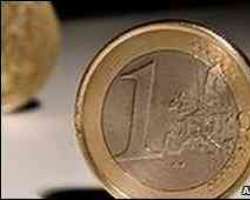GREECE DEBT DEAL BOOSTS EURO VALUE

The euro has been battered as Greece has become a Europe-wide issue
The euro has jumped sharply against the dollar and the pound after the eurozone agreed details of a multi-billion euro loan package to debt-ridden Greece.
The euro rose by more than 2 cents, or 1.5%, against the dollar, to $1.3672. Against the pound, it rose by almost 1 penny to 88.408p.
On Sunday, finance ministers of the 16 eurozone nations agreed to provide up to 30bn euros ($41bn; £27bn) in loans.
Greece hopes it will not have to ask for the emergency loans.
Instead, it hopes that an extensive package of austerity measures will help to cut its debt levels and restore confidence in Greek government debt.
This would mean it could raise money itself, rather than relying on financial assistance from the eurozone and the International Monetary Fund (IMF), which is also contributing to the 30bn euro loan package.
Raising money
EURO V POUND STERLING
Last updated: 12 Apr 2010, 09:20 UK
*Chart shows local time
€1 buys change %
0.8811 +0.0048 +0.54
More data on this currency pair
The loan deal comprises a three-year financing programme at interest rates of about 5%, based on IMF formulas.
An exact interest rate for the loans will only be finalised if Greece formally requests help.
The rate is less than the rate the Greek government would have to pay to raise money on the open market. The interest rate on Greek bonds hit a record of 7.5% last week.
Luxembourg Prime Minister Jean-Claude Juncker said there were no elements of subsidy in the loan offer.
Greece has to find about 11.5bn euros ($15.7bn; £10.2bn) by next month to meet its financial obligations. Its total debt stands at nearly 300bn euros.
It intends to auction a 1.2bn euros package of treasury bills on Tuesday.
Continuing doubts
The eurozone was forced to act after a 22bn-euro support package agreed last month failed to convince investors that Greece would be supported fully by its partners.
EURO V US DOLLAR
Last updated: 12 Apr 2010, 09:20 UK
*Chart shows local time
€1 buys change %
1.3606 +0.0133 +0.99
More data on this currency pair
In recent weeks, the euro has weakened and the rate at which the Greek government borrows money on the international capital markets has increased.
Although Greece has maintained it does not plan to turn to its eurozone partners and the IMF for any loans, investors believe it will have little choice.
The country has struggled for months to lower its borrowing costs, and investors remained unconvinced that the Greek government's programme of spending cuts and tax rises, which have proved deeply unpopular at home, will be enough to restore confidence in the country's ability to repay its debts.
On Friday, ratings agency Fitch downgraded Greek government debt by two notches, from BBB+ to BBB-.
The BBB- rating is significant, as this is the lowest rating that qualifies as an investment grade bond. Any further downgrade would mean Greece losing its investment grade status with Fitch.
If the two other major credit rating agencies, Standard & Poor's and Moody's, were to follow Fitch's lead, then a lot of big institutional fund managers, such as pension funds, would not be allowed to invest in Greek debt.
Greece is currently rated BBB+ by Standard & Poor's and A2 by Moody's.
Much will now depend on Greece's efforts to raise money this week. If it struggles to raise the 1.2bn euros it wants to, then confidence in the country's ability to repay its debts could take another dive.
